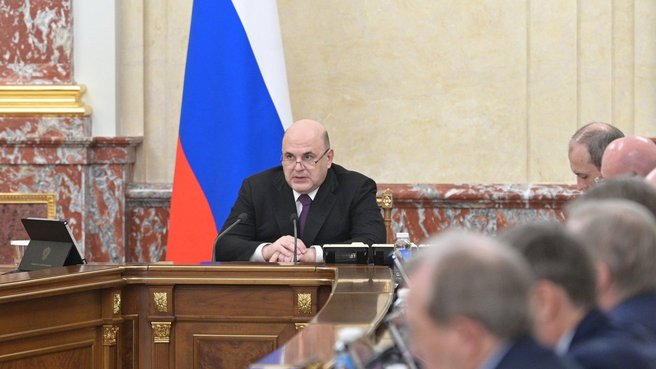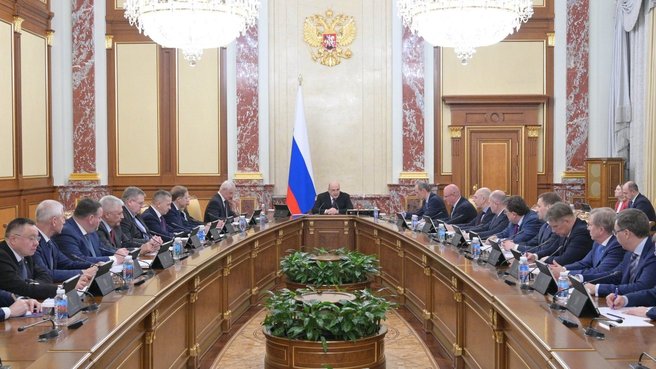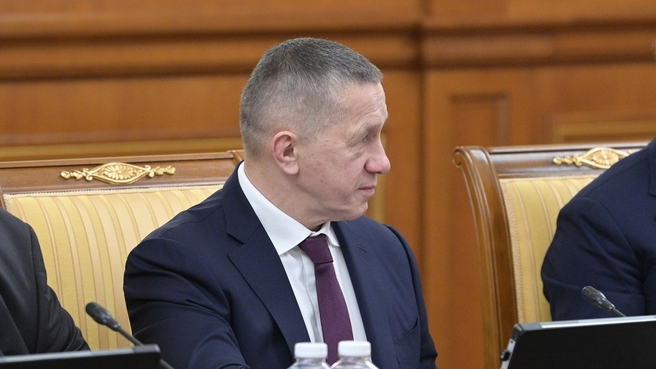Agenda: Key areas of Government activity to implement the Presidential Address to the Federal Assembly, deferment of income tax for utility and energy companies in the new regions, improving the conditions for tax holidays for those in the special military operation.
Mikhail Mishustin’s opening remarks:
Good afternoon, colleagues.
Yesterday, the President, in his Address to the Federal Assembly, outlined an entire range of strategic goals both for the current period and for the long term. In essence, he formulated a long-term plan that the Government, ministries, agencies and our regions will be implementing over the next six years.
I will speak briefly about some of these goals.
The key priority in the social sphere is supporting families with children, especially large families. President Putin used the family as the landmark for the entire national strategy.
In this regard, a detailed package of measures was outlined, from launching relevant national projects to concrete, targeted decisions. Among them were the extension of the family mortgage programme until 2030, payments of up to 450,000 roubles to pay off housing loans, and maternity capital programmes, as well as federal support for the regions, increasing tax deductions after the birth of second, third, and subsequent children. The President gave us separate instructions to work out special conditions for mortgages in small towns and regions where new blocks of flats are built in small numbers, or where they are not built at all.
In this regard, I want to ask Ms Golikova and Mr Khusnullin to personally monitor these issues in their respective areas.
Overall, our ongoing efforts should focus on establishing long-term factors for the country’s development, as thoroughly elaborated by the President in yesterday’s Address. Increasing the average incomes of our citizens is a crucial component of this work.
Addressing the demand for skilled professionals requires the establishment of a contemporary and upgraded system for their training. The President has outlined several measures in this regard. Additionally, he has instructed the Government to cooperate with regional authorities in formulating a comprehensive programme for the renovation and equipping of secondary vocational training facilities.
It is also important to develop the area of innovation and research and encourage investing in them. National projects for technological sovereignty are to be launched. They should be aimed at ensuring the sustainability of the country, for which it is necessary to establish our own production of machine tools and equipment, robotics, transport, unmanned aircraft, marine and other systems.
We also need to focus on issues of preserving the health of our people and food security, take steps to create new materials and chemical compounds, develop globally competitive products based on our unique capabilities in areas such as space, nuclear technology, and new energy sources.
Digitisation is a separate area. An entire range of tasks will be implemented as part of the specialised national project, Data Economy. It is necessary to build digital platforms in key industries and in the social sphere. The Government will also offer specific measures to support companies and startups that produce equipment for storing and processing data and that develop software.
All these and the other policies that the President spoke about are designed to ensure the continuation of the progressive development of Russia in the future, and importantly, without any outside influence.
And, of course, improving the business climate in Russia remains a priority. Together with parliament, we will have to work out the parameters for an amnesty for small companies, where tax optimisation plans were used during actual business growth.
Also, starting next year, we are to provide a mechanism for smoothly increasing the load for entities that are moving from the simplified tax schedule to the general schedule. It is important to ensure that they overcome this barrier reasonably so they are not afraid to grow and, accordingly, there are no incentives for such companies to split up their business.
It is necessary to completely switch to a risk-based approach when inspecting businesses. Small companies should receive the right to apply for credit holidays for a period of up to six months once every five years, without damaging their loan history, and be provided with the necessary and specific proposals for easing the tax liability for small and medium-sized manufacturing companies.
A number of decisions concern Russia’s regions. The President emphasised the need to continue reducing their debt burden, namely: to write off two-thirds of the debt on budget loans and allocate the freed-up resources for investment and infrastructure projects.
Furthermore, we will be outlining and executing master plans for 200 large and small cities. The entire development programme will include approximately 2,000 communities. Special support will be provided to regions that are involved in revamping public spaces, and the individual programmes for ten regions with limited budgets will be extended for an additional six years.
We were also instructed to develop and launch a new programme for relocating people from dilapidated housing and continue the ongoing modernisation of the utility infrastructure. A concerted effort will be dedicated to bringing regional roads up to standards and building bypass routes for cities and towns.
The programme to advance public transport development and renew the school bus fleet will be continued.
Colleagues,
We must start working on these and the other instructions given by the President as soon as possible and control the implementation of all measures outlined in his address. Dmitry Grigorenko from the Government Executive Office will be in charge.
Now, let’s discuss the adopted decisions.
We continue to support the development of our new regions.
The President has set the task to bring them to the nation-wide level of the quality of life. Ensuring the provision of water and heating services is the key objective. A recent allocation of 5 billion roubles has been directed towards improving the housing and utilities sector.
Furthermore, state and municipal entities engaged in housing, utilities, fuel and energy operations in the Donetsk and Lugansk people’s republics, and the Zaporozhye and Kherson regions will receive support. They will be granted a deferment on income tax for the preceding year, allowing them to settle the dues in instalments over the subsequent year. Additionally, until the end of this year, transactions in their accounts will not have limitations, even if there are outstanding tax obligations.
These measures will help these companies free-up the necessary working capital and will create more favourable conditions for their main activities.
Today’s agenda includes the issue of providing assistance to participants in the special military operation. The President emphasised that constant support for defenders and their families remains a top priority. The Government is addressing this issue through a comprehensive package of measures encompassing social, educational, and employment guarantees, along with corresponding tax benefits. Additionally, a payment deferral programme is available for consumer loans.
At the President’s instructions, legislative amendments have been drafted to improve the conditions for credit holidays like this. Under these changes, interest accrued during this period on loans for military personnel and their relatives will be waived. In cases where such interest has already been paid, the funds will be used to pay off the principal debt or other obligations.
This directive will lower the financial burden on those who are defending our Motherland, fulfilling complex and dangerous tasks.
Colleagues, it is Yury Trutnev’s birthday today.
Mr Trutnev, you have dedicated a significant part of your career to public service, and for over a decade, you have played a crucial role in a key area outlined by the President as a national priority: the development of the Far East. Your involvement in this macro-region is well-recognised. You consistently engage with the local community, addressing issues related to social welfare, industrial growth, and urban planning.
It is evident that your efforts have contributed to creating more comfortable living, working, and recreational environments, and have fostered tourism in these vital regions. These achievements reflect not only your vast managerial expertise but also your personal qualities.
I extend my heartfelt wishes for continued success, luck, good health, and all the best. Happy birthday!











